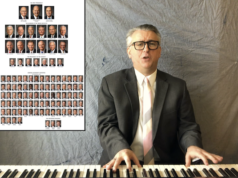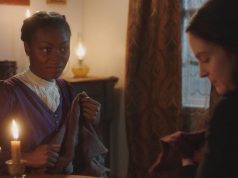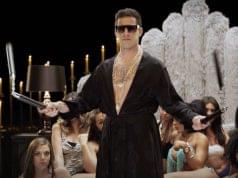“Sons of Provo” is a mockumentary about a Mormon boy band. I laugh just thinking about it, but while the movie shows promise, it isn’t as funny as a movie about a Mormon boy band ought to be.
Will Swenson, a fixture in LDS cinema (“The Singles Ward,” “The R.M.”), conceived the project with Peter Brown, the two of them writing an outline that was subsequently improvised by the actors, with Swenson taking the lead role and directing the film. Everyone involved has obviously studied the important works of this genre (especially “This Is Spinal Tap”), and the basic elements — clueless protagonists, deadpan humor, songs that are funny to us but not to the characters — are all in place.
The film begins strongly as it introduces the band members and subtly brings us into the world of Provo, Utah, the heartland of Mormon culture. Will Jensen (Will Swenson) and his brother Danny (Danny Tarasevich), 10 months apart in age and harmonizing since infancy, have just lost the friend who made them a trio and are seeking to revitalize their little band. “We want to move the band in a more positive direction, a more frugal direction, a more punctual direction,” says Will with great earnestness.
Will is an aerobics instructor and a control freak. Danny is a hothead who seeks to soften his competitive nature with recreational Buddhism. By touring around Utah to firesides, road shows and talent nights, they eventually discover Kirby Laybourne (Kirby Heyborne, also of “The R.M.”) singing in a local production of “Forever Plaid.” (If you have lived in Utah, you know that someone, somewhere, is always doing a production of “Forever Plaid,” making this one of the film’s many small jokes that will fly past most viewers.)
Kirby is naive, sweetly spiritual and prone to crying when overcome by emotion, which is often. He works at a scrapbooking store, and the fact that my word processor’s dictionary doesn’t recognize “scrapbooking” as an actual verb reminds me that people outside of Utah have no idea how keen our people are on the hobby. Kirby doesn’t make waves, and when he comes up with the perfect name for the band — Everclean — he lets Will go ahead and take credit for it.
The band learns dance moves from Yvonne Bolschweiler (Maureen Eastwood), a 60-year-old hip-hop choreographer who looks and sounds like the teapot in “Beauty and the Beast.” Their songs, written by Will and Danny (written by Swenson and Brown in real life), are hilarious, spot-on parodies of boy-band fluff, addressing in mock hipness and mock seriousness such issues as health (“Word of Wizzum”), physical beauty (“Sweet Spirit”), chastity (“Love Me But Don’t Show Me”), and the evils of profanity (“Dang, Fetch, Oh My Heck”). Indeed, the film’s soundtrack is funnier than the film itself.
Within the movie, of course, Everclean is 100 percent serious about its work, and after the usual terrible gigs (wedding receptions held in church gyms, ward firesides held in living rooms, and so forth), the boys finally start to hit it big — within Utah, of course.
The usual travails of squabbling, egotism and the pressures of fame then befall the group, and that’s where the film loses its footing. Without a clear storyline, it isn’t sure where to go or how to get there, and some scenes feel superfluous at best and embarrassing at worst. The band’s discovery in St. George, Utah, that their hotel room hasn’t been reserved leads to a useless scene, with high-strung band manager Jill (Jennifer Erekson) haggling with a cross-eyed desk clerk (Michael Birkeland) for several unfunny moments before finally giving up. The scene exemplifies the danger of including wacky, histrionics-prone characters in a mockumentary — i.e., it’s a bad idea.
I also note a scene at Will and Danny’s family reunion, where former manager Grayson (Peter Brown) gets a group called Moosebutter to make a surprise appearance. The joke is that the family doesn’t know what to make of Everclean but goes nuts for Moosebutter, and that joke might be a little funnier if you know that Moosebutter is a real group that really does perform a lot around Provo. Which means we’ve gone from including gags that only Mormons will get to including gags that only Mormons who live in Provo will get.
The finale is a mistake, pure and simple. The film ends at a climactic concert with a song that is … serious. Not just the movie pretending to be serious, but a song that is actually serious. And low-key, too, with no dancing. To end a satiric comedy with a low-energy non-humorous musical number is just wrong.
The makers of fine mockumentaries like “Waiting for Guffman” speak of the hours and hours of footage that was assembled, and how only the very best was selected for the final cut. It stands to reason there would be much to choose from: Improvising scenes and shooting without special effects means you can do almost anything relatively quickly and easily, and decide later whether it works. And so I have to wonder, where are the hours and hours of footage shot for “Sons of Provo”? Was this truly the best they had? What must the outtakes have been like, then?
For “Sons of Provo” has its amusing moments, to be sure, and the three leads are able performers and improvisers. The satire is often wickedly perceptive. But the film seems to count on the very notion of a Mormon boy band being funny enough to sustain it, and it just isn’t. “It’s such a great idea it practically writes itself!” is only a figure of speech, after all. It shouldn’t be taken literally.
C+ (1 hr., 42 min.; )





